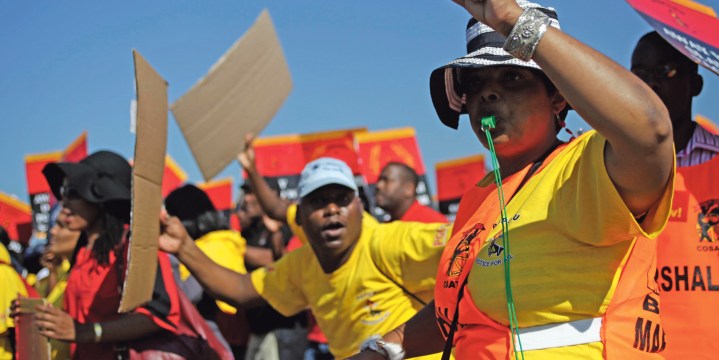WAGE DISPUTES
Public sector unions want to strike over latest 4.7% pay rise offer

The government’s offer to increase the pay of public servants has been rejected by several trade unions as too low. They say it is below the projected consumer inflation rate.
With its latest pay rise offer, the government risks irking one of its largest constituencies going into the general elections: public sector trade unions and their 1.3 million members, who are state workers.
A kerfuffle is already brewing, with some public sector trade unions threatening to down tools over the government’s insistence on a 4.7% pay rise this year.
The cost of paying public servants is projected to rise to R788.6-billion in 2025 and R822.5-billion in 2026. It’s the single largest component of government expenditure.
This offer covers the last leg of the two-year remuneration deal that public sector trade unions accepted in April 2023, on behalf of public servants including nurses, teachers, police and correctional service officers, as well as others.
At the time, these trade unions accepted the government’s offer to increase the pay of public servants by 7.5% in 2023 and by a projected consumer inflation rate in 2024. The increase for 2024 would be capped at 6.5%. Minister of Public Service and Administration Noxolo Kiviet, who is responsible for employment conditions in the state, eventually settled on 4.7%, which was implemented on 1 April.
Several union rejections
Several trade unions have rejected this offer so far, saying it is below consumer inflation. One union source described it as a “slap in the face that also leaves a bad taste in the mouth”. The unions want the government to implement a higher increase, which would be backdated.
The unions that have rejected the 4.7% offer include the Police and Prisons Civil Rights Union (Popcru), the South African Policing Union (Sapu), and the National Education, Health and Allied Workers’ Union (Nehawu). Based on the number of members these three claim to have, together they represent more than 300,000 state workers, or about 23% of public servants in the country.
The unions have threatened to strike if the government does not sweeten its offer. This would repeat the scenes of November 2022, when public sector workers, mainly nurses and administration staff, held a one-day strike and disrupted some state services.
Read more in Daily Maverick: Public servants set to receive 4.7% pay rise in 2024
A strike would come at an inopportune time for the ANC, which is hoping trade unions will endorse its re-election in the May elections. They have played a big role in the ANC’s electoral support in previous election cycles, as trade union bosses urged their members to support the governing party at the polls.
Clawing back ‘losses’
Popcru, Sapu and Nehawu have argued that the 4.7% pay rise offer will make it difficult for public sector workers to claw back “losses” they have incurred over the past five years – a period in which the government implemented a pay freeze.
And when public servants were given a pay rise, it was often a lower percentage.
Sapu national spokesperson Lesiba Thobakgale and Nehawu president Mike Shingange said the latest pay rise percentage would make future wage negotiations difficult and they wouldn’t be conducted in good faith if the government insisted on this year’s below-inflation increase. The government and trade unions will soon have to start negotiations to reach an agreement to cover the fiscal year 2025/6 and later.
Meanwhile, the Public Servants Association (PSA), which claims to represent more than 245,000 state workers, has not taken a position. Instead, it has opted to monitor inflation this year to see if it is aligned with the government’s 4.7% offer. In 2023, the inflation rate reached 6% and the Reserve Bank expects it to come in at 5% in 2024.
Reuben Maleka, the general manager of the PSA, said: “Should the CPI [consumer price index] rise above the projected CPI, the PSA will insist that the difference be augmented. The PSA is pleased that the employer [the government] will adhere to the [wage] resolution and not repeat what happened with the last leg of Resolution 1 of 2018 in 2020,” Maleka told Daily Maverick, referring to the government implementing a pay freeze and reneging on the wage deal.
Some public servants stand to receive a higher pay rise than 4.7% as they will get an additional 1.5%, which is known as a “pay progression”. A pay progression is ordinarily awarded to public servants for their years of service and performance. It is factored in every year as part of a remuneration package.
Separate housing increase
Daily Maverick understands that a separate agreement is being negotiated on a housing allowance increase, but the government wants to increase it in line with the inflation rate. Medical benefits are also yet to be determined.
It is unclear how much the 4.7% pay rise will cost the government to implement this year. The National Treasury has pencilled in R754.2-billion during the 2024/25 fiscal year to pay public servants, an increase of R33.1-billion from the 2023/24 fiscal year.
The Treasury added R144.8-billion over the next three years to the budgets of provincial health, education, home affairs, police, defence and correctional services, to cover any shortfalls in the increased cost of paying public servants, instead of the departments funding the adjustments from their existing budgets. Other departments are expected to absorb pay increases in their budgets.
The cost of paying public servants is projected to rise to R788.6-billion in 2025 and R822.5-billion in 2026. It’s the single largest component of government expenditure, gobbling up about 30% of total expenditure of R2.4-trillion in the current fiscal year. DM
This story first appeared in our weekly Daily Maverick 168 newspaper, which is available countrywide for R35.

















 Become an Insider
Become an Insider
One of the signs of getting older, I am told, is the tendency to ‘repeat oneself’
The following comment however bares repeating ‘ we are at the point where we are paying people to do a job for which there is no money for the materials to do the job’
We cannot keep on down this road, something has to give! Our civil service wage bill amounts to something like a third of total government spending. This is simply not sustainable
These government workers should be thankful they have a steady job with pension, medical aid and other benefits. Don’t give them an increase, let them strike and starve. We won’t see the difference if they strike, they will still sit around doing next to nothing.